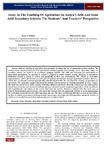Irony In The Teaching Of Agriculture In Kenya’s Arid And Semi Arid Secondary Schools: The Students’ And Teachers’ Perspective

View/
Date
2016Author
Miriam, Kyule N.
Konyango, J. J. J. Ochieng
Nkurumwa, O. Agnes
Metadata
Show full item recordAbstract
Effectiveteaching of agriculture depends partly on choice and use of appropriate teaching method. The method chosen shouldpromote practical agriculturalactivities targetingmost learning senses. Agriculture subject in secondary schools was meant to be vocational, equipping learners with skills and knowledge for participation in agricultural development. Its teachingin schools is expected to enable learners develop principles ofagricultural production relevant to Kenya in general and specifically to their own environments. The schoolsas curriculum implementation centers should take an active part in national development through agricultural activities.However, ASALs havepersistently remained agriculturally underdeveloped besides the role played by teaching of agriculture in these areas. This study thus sought to determine the methods used by teachers in teaching agriculturein ASAL schools. The study was carried out in ASAL counties of Baringo, Makueni and Narok.From the results it was clear that teachers leaned more on lecture and discussion methodsand never involved learners in practical agriculture which would boost skill acquisition for self reliance in the society. Data from the teachers themselves indicated that they used more of projects, demonstrations and discussion. This meant that teachers knew the appropriate methods to use in implementing the curriculum practically but they didn’t put them into use. The study recommends that there is need for agriculture teachers to embrace participatory teaching methods that promote knowledge and skill acquisition among the learners if ASALs are to benefit from curriculum implementation in secondary schools.
